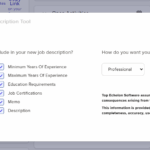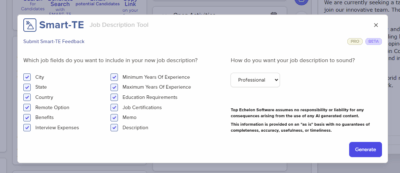In the highly competitive world of recruitment, building and maintaining stronger relationships with both candidates and clients is crucial for long-term success. For agency recruiters and search consultants, leveraging recruiting agency software can significantly enhance the quality of these relationships.
This blog post will explore how recruiting agency software can be used to build stronger, more productive relationships with candidates and clients, ultimately leading to improved recruitment outcomes and business growth.
The Importance of Stronger Relationships in Recruitment
Enhancing Candidate Experience
A positive candidate experience is essential for attracting and retaining top talent. Strong relationships with candidates ensure that they feel valued, respected, and well-informed throughout the recruitment process. This leads to higher engagement, better retention rates, and a positive reputation for the recruitment agency.
Building Client Trust
Clients rely on recruiters to find the best talent for their organizations. Building strong relationships with clients fosters trust, improves communication, and ensures that recruiters fully understand their clients’ needs and expectations. This leads to more successful placements and long-term client partnerships.
Improving Recruitment Outcomes
Strong relationships with candidates and clients result in better matches, faster placements, and higher satisfaction rates. When candidates and clients trust and respect their recruiters, they are more likely to engage in open communication, provide honest feedback, and collaborate effectively.
Leveraging Recruiting Agency Software to Build Stronger Relationships
Recruiting agency software offers a range of tools and features that can help recruiters build and maintain stronger relationships with both candidates and clients. Here are some key strategies for leveraging these tools effectively:
1. Centralized Candidate Database
A centralized candidate database is the cornerstone of effective relationship management. It allows recruiters to store, organize, and access candidate information easily, ensuring that they have all the necessary details at their fingertips.
Detailed Candidate Profiles
Creating detailed candidate profiles within the software helps recruiters keep track of important information such as contact details, work experience, skills, education, and preferences. This allows for more personalized interactions and better candidate matching.
- Comprehensive Information: Include details such as resumes, cover letters, interview notes, and assessment results in candidate profiles.
- Regular Updates: Keep candidate profiles up to date with the latest information, including new skills, job changes, and updated contact details.
Advanced Search and Filtering
Advanced search and filtering capabilities enable recruiters to quickly find candidates who match specific job requirements. This ensures that candidates are considered for relevant opportunities, improving their experience and satisfaction.
- Boolean Search: Use Boolean search operators to create complex search queries and narrow down candidate lists based on specific criteria.
- Custom Filters: Create custom filters based on job requirements, skills, experience levels, and other relevant factors.
2. Candidate Relationship Management (CRM)
CRM features within recruiting software are designed to help recruiters manage and nurture relationships with candidates. By using these tools effectively, recruiters can build stronger connections and improve candidate engagement.
Personalized Communication
Personalized communication is key to building stronger relationships with candidates. Use CRM tools to send personalized messages, follow-ups, and updates throughout the recruitment process.
- Email Templates: Create and use personalized email templates for different stages of the recruitment process, such as application acknowledgments, interview invitations, and feedback requests.
- Automated Workflows: Set up automated workflows to send personalized messages at specific stages, ensuring timely and consistent communication.
Regular Check-Ins
Regular check-ins with candidates help maintain engagement and show that you value their experience and feedback. Use CRM tools to schedule and manage these interactions.
- Scheduled Follow-Ups: Schedule regular follow-ups with candidates to provide updates, answer questions, and address concerns.
- Feedback Collection: Use CRM tools to collect feedback from candidates about their experience and use this information to make improvements.
Candidate Engagement
Engage candidates by sharing relevant content, job opportunities, and industry news. Use CRM tools to segment candidates based on their interests and preferences.
- Content Sharing: Share articles, blog posts, and resources that are relevant to candidates’ interests and career goals.
- Job Alerts: Set up job alerts to notify candidates about new opportunities that match their profiles.
3. Client Relationship Management
Building stronger relationships with clients is essential for successful placements and long-term partnerships. Recruiter agency software offers a range of tools to help manage and nurture client relationships.
Detailed Client Profiles
Create detailed client profiles within the software to keep track of important information such as contact details, company background, hiring preferences, and past interactions.
- Comprehensive Information: Include details such as job orders, placement history, client feedback, and communication records in client profiles.
- Regular Updates: Keep client profiles up to date with the latest information, including new job orders, changes in hiring preferences, and updated contact details.
Effective Communication
Effective communication is crucial for building client trust and ensuring successful placements. Use the software’s communication tools to stay in touch with clients and provide regular updates.
- Email Templates: Create and use personalized email templates for different stages of the client relationship, such as job order confirmations, candidate submissions, and feedback requests.
- Automated Workflows: Set up automated workflows to send personalized messages at specific stages, ensuring timely and consistent communication.
Regular Check-Ins
Regular check-ins with clients help maintain engagement and show that you value their partnership. Use CRM tools to schedule and manage these interactions.
- Scheduled Follow-Ups: Schedule regular follow-ups with clients to provide updates, discuss new job orders, and address any concerns.
- Feedback Collection: Use CRM tools to collect feedback from clients about their experience and use this information to make improvements.
4. Enhanced Collaboration
Recruiting agency software facilitates enhanced collaboration between recruiters, candidates, and clients. By using these tools effectively, recruiters can improve communication, streamline processes, and build stronger relationships.
Collaboration Tools
Collaboration tools such as shared calendars, task management, and project management features help recruiters coordinate their efforts and work more efficiently.
- Shared Calendars: Use shared calendars to schedule interviews, meetings, and follow-ups, ensuring that all parties are on the same page.
- Task Management: Use task management tools to assign and track tasks, ensuring that nothing falls through the cracks.
- Project Management: Use project management features to manage recruitment projects, track progress, and collaborate with team members.
Candidate Portals
Candidate portals provide candidates with a personalized space where they can access important information, submit documents, and communicate with recruiters.
- Document Submission: Allow candidates to upload resumes, cover letters, and other documents directly through the portal.
- Communication: Use the portal to communicate with candidates, provide updates, and answer questions.
- Interview Scheduling: Allow candidates to schedule interviews and view their interview schedules through the portal.
Client Portals
Client portals provide clients with a personalized space where they can access important information, review candidate profiles, and communicate with recruiters.
- Candidate Reviews: Allow clients to review candidate profiles, provide feedback, and request additional information through the portal.
- Job Order Management: Allow clients to submit and manage job orders directly through the portal.
- Communication: Use the portal to communicate with clients, provide updates, and answer questions.
5. Data-Driven Decision Making
Recruiting agency software provides valuable data and insights that can help recruiters make informed decisions and improve their relationships with candidates and clients.
Analytics and Reporting
Use analytics and reporting tools to track key metrics, identify trends, and measure the effectiveness of your recruitment efforts.
- Key Metrics: Track metrics such as time-to-fill, cost-per-hire, candidate source effectiveness, and client satisfaction.
- Custom Reports: Create custom reports to analyze specific aspects of your recruitment process and identify areas for improvement.
- Data Visualization: Use data visualization tools to present data in easy-to-understand visual formats, such as charts and graphs.
Performance Monitoring
Monitor the performance of your recruitment efforts to identify areas for improvement and ensure that you are meeting the needs of candidates and clients.
- Candidate Satisfaction: Track candidate satisfaction through surveys and feedback forms, and use this information to make improvements.
- Client Satisfaction: Track client satisfaction through surveys and feedback forms, and use this information to make improvements.
- Recruiter Performance: Monitor the performance of your recruiters, including metrics such as placement success rates, client satisfaction, and candidate engagement.
Continuous Improvement
Use data and insights to continuously improve your recruitment processes and enhance your relationships with candidates and clients.
- Identify Trends: Analyze data to identify trends and patterns in candidate and client behavior, and use this information to make informed decisions.
- Implement Changes: Use insights from data analysis to implement changes and improvements in your recruitment processes.
- Measure Impact: Continuously measure the impact of your changes and improvements to ensure that they are delivering the desired results.
6. Compliance and Data Security
Ensuring compliance with data protection regulations and maintaining data security is crucial for building trust with candidates and clients. Recruiting agency software offers tools to help manage compliance and data security effectively.
Data Protection
Ensure that candidate and client data is stored securely and in compliance with data protection regulations such as GDPR and CCPA.
- Secure Storage: Use secure storage solutions to protect candidate and client data from unauthorized access.
- Encryption: Use encryption to protect sensitive data during transmission and storage.
- Access Controls: Implement access controls to ensure that only authorized personnel have access to candidate and client data.
Compliance Management
Use compliance management tools to ensure that your recruitment processes comply with data protection regulations and industry standards.
- Consent Management: Use consent management tools to obtain and manage candidate and client consent for data processing.
- Audit Trails: Maintain audit trails of candidate and client interactions to ensure transparency and accountability.
- Compliance Audits: Conduct regular compliance audits to identify and address any potential compliance issues.
7. Post-Placement Engagement
Building stronger relationships with candidates and clients doesn’t end with placement. Post-placement engagement is crucial for maintaining long-term relationships and ensuring satisfaction.
Onboarding Support
Provide onboarding support to placed candidates to ensure a smooth transition into their new roles.
- Onboarding Materials: Provide candidates with onboarding materials such as employee handbooks, training resources, and company information.
- Regular Check-Ins: Schedule regular check-ins with placed candidates to provide support, answer questions, and address any concerns.
- Feedback Collection: Collect feedback from placed candidates about their onboarding experience and use this information to make improvements.
Client Follow-Up
Follow up with clients after placement to ensure that they are satisfied with the candidate and the recruitment process.
- Placement Feedback: Collect feedback from clients about the placement and use this information to make improvements.
- Ongoing Support: Provide ongoing support to clients, including assistance with onboarding, training, and performance management.
- Relationship Building: Continue to build and nurture relationships with clients to ensure long-term partnerships and repeat business.
8. Continuous Learning and Development
Investing in continuous learning and professional development is essential for building stronger relationships with candidates and clients. By staying updated with the latest trends, technologies, and best practices, recruiters can provide better service and build trust with their stakeholders.
Training and Certification
Participate in training programs and obtain professional certifications to enhance your skills and knowledge.
- Industry Certifications: Obtain industry certifications such as Certified Personnel Consultant (CPC) or Certified Temporary Staffing Specialist (CTS) to demonstrate your expertise and credibility.
- Training Programs: Enroll in training programs to learn about the latest recruitment strategies, technologies, and best practices.
Professional Development
Engage in professional development activities to stay updated with industry trends and continue learning and growing.
- Webinars and Workshops: Attend webinars and workshops to learn from industry experts and gain valuable insights.
- Networking Events: Participate in networking events to connect with peers, share experiences, and learn from each other.
- Industry Conferences: Attend industry conferences to stay informed about the latest trends and developments in recruitment.
Building stronger relationships with candidates and clients is essential for long-term success in the recruitment industry. By leveraging recruitment agency software effectively, recruiters can enhance communication, improve engagement, and provide better service to their stakeholders.
From centralized candidate databases and CRM tools to enhanced collaboration and data-driven decision making, recruiting agency software offers a range of features that can help recruiters build and maintain stronger relationships. By following the strategies outlined in this guide, agency recruiters and search consultants can improve their recruitment outcomes, foster trust, and ensure long-term success in the competitive world of recruitment.









